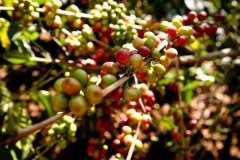What is the reason for the change of coffee flavor? why does temperature affect coffee?
Coffee flavor changes gradually over time and may be influenced by three factors:
The first factor is the temperature characteristic of taste. Even if you taste the same thing, as long as the temperature is different, the sour, bitter and sweet feelings will change. When cold drinks are made, bitter and sweet tastes are less likely to be felt, and sour tastes are more likely to be felt.
The second factor is the change in composition. Coffee contains many ingredients that change easily, and if brewed at a high temperature, they change gradually.
The third factor is oxygen. The oxygen in coffee causes changes in coffee. I've heard the saying,"Fill the kettle with coffee and you won't have to worry about oxygen exposure," but that's a mistake. The oxygen dissolves in the coffee, so this is only a temporary solution.
So, if you want to keep the flavor good for a long time, what should you do? Unfortunately, there is no perfect answer to this question. To keep coffee in the way of rapid freezing, reheating it when drinking, this method has some effect, but it must be heated evenly, and it must not be overheated, and it must be done in a short time, otherwise it will appear overcooked taste. Heating with a gas oven or microwave oven is easy to cause local overheating, and heating with water is very time-consuming. Personally, it's easier to drink iced coffee straight from the table or a quick-frozen espresso mixed with hot water. I think coffee is basically good to taste when it's freshly brewed.
I want you to learn to enjoy the variety of coffee. As long as you can get rid of the preconceived notion that coffee is hot, you can see more coffee appeal. People often say,"Good coffee tastes good even when it's cold," and I agree. In the process of drinking coffee, the temperature slowly drops, and at the same time, the sour and bitter tastes gradually change their balance, and the viscosity increases, which will produce a rich taste.

Important Notice :
前街咖啡 FrontStreet Coffee has moved to new addredd:
FrontStreet Coffee Address: 315,Donghua East Road,GuangZhou
Tel:020 38364473
- Prev

The bitterness of coffee. How did coffee bitterness come from?
Caffeine is the most well-known bitter ingredient in coffee, but caffeine actually accounts for only 10% of the bitter taste. This can be understood from the fact that the concentration of caffeine in roasted beans is not affected by the degree of baking, and that decaffeinated coffee also has a bitter taste. So where does the remaining 90% of the bitterness come from? One of the sources of coffee bitterness is brown pigment. Brown color
- Next

Relationship between grinding, extraction rate and concentration Black coffee
Coffee extraction is like doing an experiment, controlling the change between solvent (water) and solute (coffee) under environmental variables. How to make the effective substances in coffee dissolve according to demand under appropriate conditions is the experimental theme of all coffee lovers. Shotsmrkt. will regularly collate coffee brewing experiences and imaginations under the name of "coffee addiction". Make a good cup of coffee.
Related
- Beginners will see the "Coffee pull flower" guide!
- What is the difference between ice blog purified milk and ordinary milk coffee?
- Why is the Philippines the largest producer of crops in Liberia?
- For coffee extraction, should the fine powder be retained?
- How does extracted espresso fill pressed powder? How much strength does it take to press the powder?
- How to make jasmine cold extract coffee? Is the jasmine + latte good?
- Will this little toy really make the coffee taste better? How does Lily Drip affect coffee extraction?
- Will the action of slapping the filter cup also affect coffee extraction?
- What's the difference between powder-to-water ratio and powder-to-liquid ratio?
- What is the Ethiopian local species? What does it have to do with Heirloom native species?

